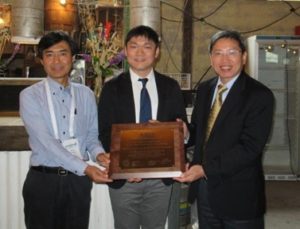Thematic Issue – Letters: Nanomechanics and Nanomanipulation of Low-Dimensional Nanomaterials
Call for Papers-Special Issue TNANO LETTERS
Nanomechanics and Nanomanipulation of Low-Dimensional Nanomaterials
IEEE International Conference on Nanotechnology (IEEE-NANO 2019)
With the rapid developments of low-dimensional (1D and 2D) nanomaterials in the last decades, critical issues
emerge regarding the precise manipulation and mechanical characterization of individual nanoscale building
blocks for their further electronic and functional applications. Various nanomanipulation and characterization
systems (such as AFM-atomic force microscopy, optical tweezers, magnetic field control, nanoindentation
techniques, etc) had been proposed since the 1990s. With the help of scanning and transmission electron
microscopy (SEM and TEM) as well as super-resolution optical microscopes, researchers now have the power to
manipulate and measure individual nanostructures with an intuitionistic, real-time, and in situ way, which
effectively accelerated the characterization and application of these nanomaterials in electronics, mechatronic
and biomedical fields. Despite these fascinating progresses, mechanics is the fundamental branch of natural
science, which concerned with the behavior of physical bodies when subjected to force or displacement, which
remains critical for structures at the nanoscale. Due to their nanosizes and high surface-area-to-volume ratio,
superior and unconventional mechanical properties, low-dimensional nanomaterials have significant influences
on their integration and real-device performance of the low-dimensional nanosystems.
The “Letters” Section (i.e., maximum of 4 pages of manuscript) in the IEEE Transactions on Nanotechnology
(TNANO) will devote a themed issue on “Nanomechanics and Nanomanipulation of Low-Dimensional
Nanomaterials” to a collection of papers reflecting a more focused scope of the IEEE-NANO 2019
conference, especially highlighting research and technology development in the field of electronic and electrical
engineering, M/NEMS, micro/nanofabrication, nanomechanical sensors and actuators, micro/nanorobotics, and
1D/2D nanomaterials' mechanical behavior and deformation mechanism. We are accepting submissions only
from authors who have submitted abstracts for review to the conference, and invited speakers including Invite
Sessions, Keynote, and Plenary Speakers. Authors whose abstract has been accepted by the conference and
will submit full paper for IEEE Xplore Database inclusion MUST significantly expand and improve the previous
conference version to contain substantially new technical results for consideration of this Special Issue. (Please
refer to the information in the following website for IEEE TNANO regulations:
https://site.ieee.org/tnano/author-info/
All submitted manuscripts will undergo a full peer review process. Areas of interest include but are not limited to:
- Mechanical design of novel nanomanipulation and nanorobotic systems
- in situ SEM/TEM/SPM mechanical characterization of 1D (nanowire/nanotube) and 2D (graphene/MoS2 etc.)
nanomaterials - Modeling and simulation of mechanical properties of low-dimensional nanomaterials, based on first principles,
molecular dynamics, etc - Mechanical properties of nanoelectronics and electromechanical systems and flexible electronics
- Electromechanical properties, fatigue properties, interfacial properties of low-dimensional nanomaterials
and their solid/liquid interfaces
Accepted papers are published on the web in IEEE Xplore as soon as they are submitted in final form.
Web-published papers have a DOI (Digital Object Identifier), and are fully citable and downloadable.
Submissions are solicited from conference participants and other researchers in the field of original research
and perspectives and mini-reviews on emerging topics for this themed issue. Papers submitted to the “Letters”
are limited to a maximum of 4 journal pages in the two-column IEEE format, which includes figures, tables, and references.
Manuscripts will be subject to the same competitive and constructive peer-review criteria of TNANO with no article publishing charges.
Follow the guideline (https://site.ieee.org/tnano/author-info/), and submit your paper to ScholarOne
Manuscripts at http://mc.manuscriptcentral.com/tnano, indicating in the cover letter that you wish the paper
to be considered for the Special Issue “IEEE Transactions on Nanotechnology (TNANO) Special Section/Issue on the Annual IEEE International Conference on Nanotechnology (IEEE-NANO 2019)”. Note that the submitted
article cannot be a verbatim copy of a published conference article and your manuscript must contain at least 30% new results when compared with IEEE NANO 2019 conference papers.
Deadlines
- Submission deadline: August 31, 2019
- Notification of first review results: September 30, 2019
- Submission of revised papers: October 31, 2019
- Notification of final review results: November 30, 2019
Expected Date of Publication: The typical review process for TNANO is ~30 days before first decision. Once
accepted and the authors have complied with all IEEE copyright issues your paper will receive an official DOI
number and your paper will be available online on TNANO website under IEEE Xplore database. (Starting in
January 2019, IEEE TNANO will no longer have hardcopies, so as soon as your paper is accepted and approved
for final publication by the IEEE, it will be added to the transaction’s publication list, and will be SCI indexed.)
The expected publication date from your manuscript submission from receiving a DOI for your paper is ~100
days based on 2018 publication database)
Guest editors
Yang LU, Ph.D. (Leading Guest Editor for Inquiry)
Associate Professor
Department of Mechanical Engineering
City University of Hong Kong
Hong Kong SAR, China
Email: yanglu@cityu.edu.hk
Weidong WANG, Ph.D.
Professor
School of Mechano-Electronic Engineering
Research Center of Micro/Nano Systems
Xidian University
Xi’an, Shaanxi 710071, China
Email: wangwd@mail.xidian.edu.cn
Minglin LI, Ph.D.
Associate Professor
School of Mechanical Engineering and Automation
Fuzhou University
Fuzhou, Fujian 350108, China
Email: liminglin@fzu.edu.cn
Contact person
Yang LU, Ph.D.
Associate Professor
Department of Mechanical Engineering
City University of Hong Kong
Room Y6613, Yeung Kin Man Academic Building
Phone: +852-3442-4061
Email: yanglu@cityu.edu.hk


